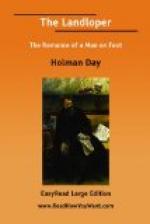His associates were staring at him and Colonel Dodd was giving him furious glances. He had spoken with enthusiasm. He broke off suddenly.
“I beg your pardon. I don’t mean to go quite so far. But I’m a student of history and I’ve read a lot about natural-born leaders.”
“You evidently know more about history than you do about politics,” growled the colonel. “This whole state committee doesn’t seem to know much politics. If you have allowed that Farr to slime his way around under cover and do you up in your own counties, I’ll see to it that we have a new state committee.”
“I have an idea that that convention out there will attend to the matter of a new state committee for us.”
The new speaker’s voice was very soft. His nickname in state politics was “Whispering Saunders.” He was known as being the most artistic political “pussy-foot” in the party. It was averred that he could put on rubber boots and run twice around the State House on a fresh fall of light snow and not leave a track.
“If I’m any kind of a smeller—and I reckon it’s admitted that I am,” purred Saunders, “we are walloped before the start-off in every county delegation out on that floor.”
“But what has been the matter with you fellows all the time?” blazed the boss. “Up to now you have been reporting simply that the soreheads were growling and were not getting together so as to be dangerous.”
“Did you ever try to shovel up soft soap from a cellar floor with a knitting-needle?” inquired the politician. “That’s how it’s been in this case. Every man I talked with was slippery. I know slippery times when I see ’em. I’ve been afraid, but I hoped for the best. Now that they are here, with this convention due to be called to order, they are not slippery any longer. They don’t need to be. I’ve just been through the convention hall. They are out and open—and they’re against us.”
“That Farr has a proxy from a delegate in the Eleventh Ward and is on the floor,” stated another.
“But he isn’t a voter.”
“He wasn’t a little while ago, but he is to-day, Colonel. The board of registration had to put his name on the books—he has lived here long enough to become a voter.”
Colonel Dodd glared from face to face. It was plain that he was angered rather than dismayed; he was like a bull at bay, shaking the pricking darts out of his shoulders. He took a hasty glance at his watch. ’Twas twenty minutes past the hour appointed for the calling of the convention. He could hear the distant band still bellowing bravely to kill time.
A giant of a man stood up—a cool man, rather cynical. He was the chairman of the state committee.




